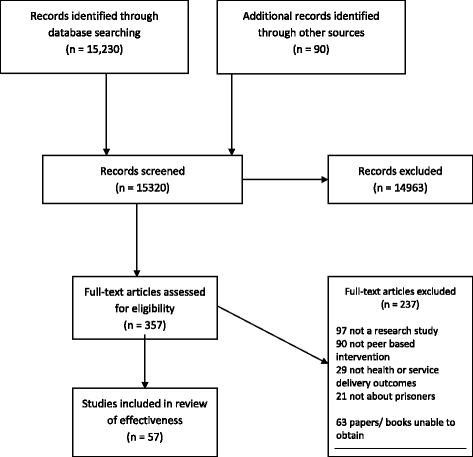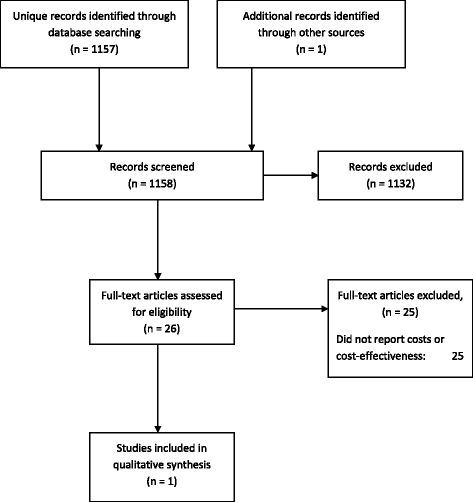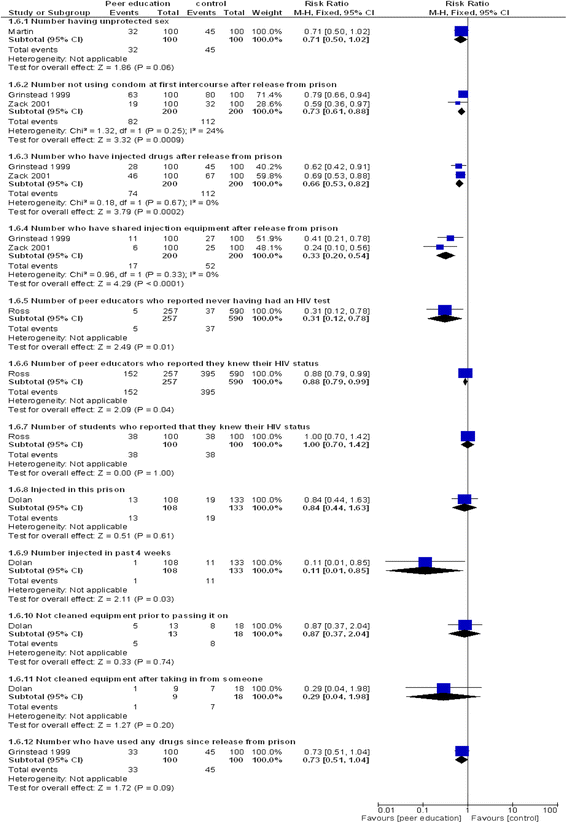A systematic review of the effectiveness and cost-effectiveness of peer education and peer support in prisons
- PMID: 25880001
- PMCID: PMC4404270
- DOI: 10.1186/s12889-015-1584-x
A systematic review of the effectiveness and cost-effectiveness of peer education and peer support in prisons
Abstract
Background: Prisoners experience significantly worse health than the general population. This review examines the effectiveness and cost-effectiveness of peer interventions in prison settings.
Methods: A mixed methods systematic review of effectiveness and cost-effectiveness studies, including qualitative and quantitative synthesis was conducted. In addition to grey literature identified and searches of websites, nineteen electronic databases were searched from 1985 to 2012. Study selection criteria were:
Population: Prisoners resident in adult prisons and children resident in Young Offender Institutions (YOIs).
Intervention: Peer-based interventions.
Comparators: Review questions 3 and 4 compared peer and professionally led approaches.
Outcomes: Prisoner health or determinants of health; organisational/process outcomes; views of prison populations.
Study designs: Quantitative, qualitative and mixed method evaluations.
Results: Fifty-seven studies were included in the effectiveness review and one study in the cost-effectiveness review; most were of poor methodological quality. Evidence suggested that peer education interventions are effective at reducing risky behaviours, and that peer support services are acceptable within the prison environment and have a positive effect on recipients, practically or emotionally. Consistent evidence from many, predominantly qualitative, studies, suggested that being a peer deliverer was associated with positive effects. There was little evidence on cost-effectiveness of peer-based interventions.
Conclusions: There is consistent evidence from a large number of studies that being a peer worker is associated with positive health; peer support services are also an acceptable source of help within the prison environment and can have a positive effect on recipients. Research into cost-effectiveness is sparse.
Systematic review registration: PROSPERO ref: CRD42012002349.
Figures
References
-
- Senior J, Shaw J. Prison healthcare. In: Jewkes Y, editor. Handbook on prisons. Cullompton: Willan Publishing; 2007. pp. 377–98.
-
- Department of Health . Choosing health. Making healthier choices easier. London: The Stationary Office; 2004.
-
- Social Exclusion Unit . Reducing re-offending by ex-prisoners. London: Crown; 2002.
-
- Ministry of Justice . Population and capacity briefing for 6th December, 2013. London: Ministry of Justice; 2013.
Publication types
MeSH terms
Grants and funding
LinkOut - more resources
Full Text Sources
Other Literature Sources




